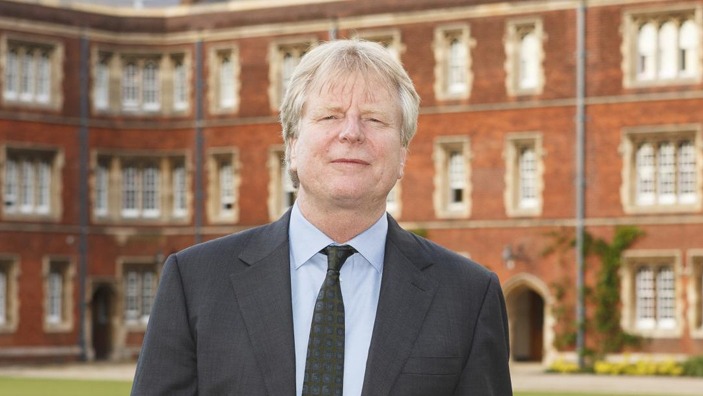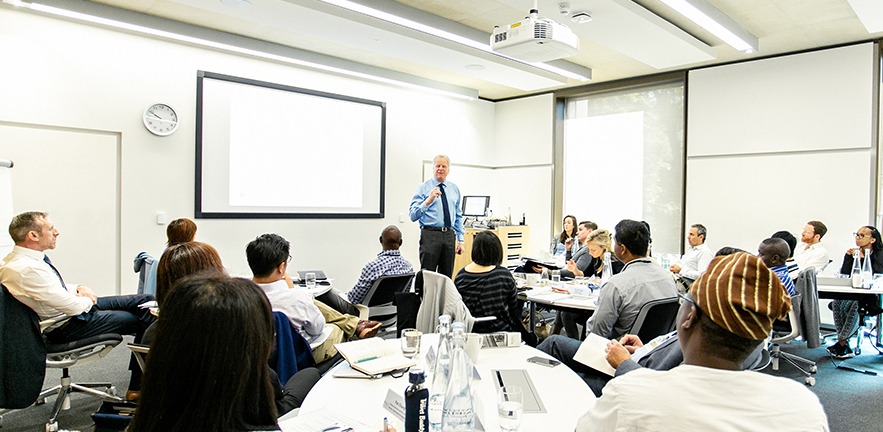Professor of Economics and Organisation
Professorial Fellow of Girton College
BCom (Hons), MCom (University of the Witwatersrand), MPhil, PhD (University of Cambridge)
My research interests include decision-making under extreme uncertainty, social ontology and the ontology of technology, explanation in the social sciences, innovation and entrepreneurship, institutional economics, and the economics of the Austrian School. I’m co-editor of the Cambridge Journal of Economics and have previously been awarded the Pilkington Prize for Excellence in Teaching.
I’m a member of the Economics and Policy subject group at Cambridge Judge Business School, which analyses how economics can improve growth and business performance.

Professional experience
Jochen is co-editor of the Cambridge Journal of Economics and an associate of the Cambridge Social Ontology Group (CSOG). He has been Director of Faculty at Cambridge Judge Business School (2017-2020), Director of the MBA (2008-2013), Director of Programmes (2007-2008) and Head of the Economics & Policy subject group (2015-2017). He is a former Fellow of the Cambridge-MIT Institute (CMI), where he was Associate Director of the Professional Practice Programme (2001-2003) and Director of Graduate Programmes (2003-2005), and has served as Graduate Tutor at Girton College (1998-2005), Chair of the Chemical Engineering and Biotechnology Syndicate (2008-2016), and on the University of Cambridge Board of Graduate Studies (2003-2008) and Executive Committee of the Careers Syndicate (2008-2011).
Previous appointments
Jochen has taught at Cambridge Judge Business School since 1999, prior to which he was Fellow and Lecturer in Economics (1992-1999) and Doris Woodall Research Fellow (1991-1992) at Girton College, Cambridge. Before moving to Cambridge, he was Lecturer in Economics at the Department of Economics, University of the Witwatersrand, in Johannesburg (1984-1990).
Publications
- Selected publications
- Journal articles
- Special issues of journals
- Books, monographs, reports and case studies
- Book chapters
Selected publications
- Faulkner, P. and Runde, J. (2019) “Theorizing the digital object.” MIS Quarterly, 43(4): 1279-1302 (DOI: 10.25300/MISQ/2019/13136)
- Feduzi, A. and Runde, J. (2014) “Uncovering unknown unknowns: towards a Baconian approach to management decision-making.” Organizational Behavior and Human Decision Processes, 124(2): 268-283 (DOI: 10.1016/j.obhdp.2014.04.001)
- Ellsaesser, F., Tsang, E.W.K. and Runde, J. (2014) “Models of causal inference: imperfect but applicable is better than perfect but inapplicable.” Strategic Management Journal, 35(10): 1541-1551 (DOI: 10.1002/smj.2164)
- Faulkner, P. and Runde, J. (2013) “Technological objects, social positions and the transformational model of social activity.” MIS Quarterly, 37(3): 803-818
- Feduzi, A., Runde, J. and Zappia, C. (2012) “De Finetti on the insurance of risks and uncertainties.” British Journal for the Philosophy of Science, 63(2): 329-356 (DOI: :10.1093/bjps/axr028)
- Faulkner, P. and Runde, J. (2009) “On the identity of technological objects and user innovations in function.” Academy of Management Review, 34(3): 442-462
Journal articles
- Runde, J. (2026) “Shades of realism.” Review of Austrian Economics (DOI: 10.1007/s11138-025-00714-1) (published online Dec 2025)
- Lewis, P., Pratten, S. and Runde, J. (2025) “Ontological theorising and the history of economic thought: an introduction.” Cambridge Journal of Economics, 49(6): 1115-1122 (DOI: 10.1093/cje/beaf054)
- Lewis, P. and Runde, J. (2025) “Bloomington and Cambridge compared: varieties of ontological thinking, social positioning, and the self-governance of common-pool resources.” Cambridge Journal of Economics, 49(6): 1495-1516 (DOI: 10.1093/cje/beae018)
- Derbyshire, J., Feduzi, A. and Runde, J. (2023) “Borrowing from Keynes’ A treatise on probability: non-probabilistic measure of uncertainty for scenario planning.” European Management Review, 20(4): 638-650 (DOI: 10.1111/emre.12549)
- Feduzi, A., Faulkner, P., Runde, J., Cabantous, L. and Loch, C.H. (2022) “Heuristic methods for updating small world representations in strategic situations of Knightian uncertainty.” Academy of Management Review, 47(3): 402-424 (DOI: 10.5465/amr.2018.0235)
- Feduzi, A., Runde, J. and Schwarz, G. (2022) “Unknowns, Black Swans, and bounded rationality in public organizations.” Public Administration Review, 82(5): 958-963 (DOI: 10.1111/puar.13522)
- Heuer, T. and Runde, J. (2022) “The Elbphilharmonie and the Hamburg effect: on the social positioning, identities and system functions of a building and a city.” European Planning Studies, 30(1): 85-104 (DOI: 10.1080/09654313.2021.1908232)
- Cardinale, I. and Runde, J. (2021) “From dishwashing to dishwasher cooking: on social positioning and how users are drawn towards alternative uses of existing technology.” Cambridge Journal of Economics, 45(4): 613-630 (DOI: 10.1093/cje/beab026)
- Faulkner, P., Feduzi, A., McCann Jr, C.R. and Runde, J. (2021) “F.H. Knight’s Risk, uncertainty, and profit and J.M. Keynes’ Treatise on probability after 100 years.” Cambridge Journal of Economics, 45(5): 857-882 (DOI: 10.1093/cje/beab035)
- Runde, J., Feduzi, A. and Cabantous, L. (2021) “Commentary on Brian T. McCann’s ‘Bayesian updating’.” California Management Review, 25 April 2021
- Runde, J., Lewis, P. and Graça Moura, M. (2020) “Ontology and the history of economic thought: an introduction.” Cambridge Journal of Economics, 44(5): 981-990 (DOI: 10.1093/cje/beaa039)
- Faulkner, P. and Runde, J. (2019) “Theorizing the digital object.” MIS Quarterly, 43(4): 1279-1302 (DOI: 10.25300/MISQ/2019/13136)
- Fontana, G., Pitelis, C. and Runde, J. (2019) “Financialisation and the new capitalism?” Cambridge Journal of Economics, 43(4): 799-804 (DOI: 10.1093/cje/bez029)
- Feduzi, A., Runde, J., Cabantous, L., Faulkner, P. and Loch, C. (2018) “Updating ‘small world representations’ in strategic decision-making under extreme uncertainty.”Academy of Management Proceedings, 2018(1) (DOI: 10.5465/AMBPP.2018.141)
- Faulkner, P., Feduzi, A. and Runde, J. (2017) “Unknowns, Black Swans and the risk / uncertainty distinction.”Cambridge Journal of Economics, 41(5): 1279-1302 (DOI: 10.1093/cje/bex035)
- Faulkner, P., Pratten, S. and Runde, J. (2017) “Cambridge social ontology: clarification, development and deployment.”Cambridge Journal of Economics, 41(5): 1265–1277 (DOI: 10.1093/cje/bex048)
- Feduzi, A., Runde, J. and Zappia, C. (2017) “De Finetti and Savage on the normative relevance of imprecise reasoning: a reply to Arthmar and Brady.”History of Economic Ideas, 25(1): 211-223 (DOI: 10.17863/CAM.8789)
- Pitelis, C. and Runde, J. (2017) “Capabilities, resources, learning and innovation: a blueprint for a post-classical economics and public policy.”Cambridge Journal of Economics, 41(3): 679–691 (DOI: 10.1093/cje/bex022)
- Jackson, P., Runde, J., Dobson, P. and Richter, N. (2016) “Identifying mechanisms influencing the emergence and success of innovation within national economies: a realist approach.”Policy Science, 49(3): 233-256 (DOI: 10.1007/s11077-015-9237-6
- Ellsaesser, F., Tsang, E.W.K. and Runde, J. (2014) “Models of causal inference: imperfect but applicable is better than perfect but inapplicable.”Strategic Management Journal, 35(10): 1541-1551 (DOI: 10.1002/smj.2164)
- Feduzi, A. and Runde, J. (2014) “Uncovering unknown unknowns: towards a Baconian approach to management decision-making.”Organizational Behavior and Human Decision Processes, 124(2): 268-283 (DOI: 10.1016/j.obhdp.2014.04.001)
- Feduzi, A., Runde, J. and Zappia, C. (2014) “De Finetti on uncertainty.”Cambridge Journal of Economics, 38(1): 1-21 (DOI: 10.1093/cje/bet054)
- Faulkner, P. and Runde, J. (2013) “Technological objects, social positions, and the transformational model of social activity.” MIS Quarterly, 37(3): 803-818
- Feduzi, A., Runde, J. and Zappia, C. (2012) “De Finetti on the insurance of risks and uncertainties.” British Journal for the Philosophy of Science, 63(2): 329-356 (DOI: :10.1093/bjps/axr028)
- Feduzi, A. and Runde. J. (2011) “The uncertain foundations of the welfare state.” Journal of Economic Behavior and Organization, 80(3): 613-627 (DOI: 10.1016/j.jebo.2011.06.002)
- Faulkner, P., Lawson, C. and Runde, J. (2010) “Theorising technology.” Cambridge Journal of Economics, 34(1): 1-16
- Runde, J. and de Rond, M. (2010) “Evaluating causal explanations of specific events.” Organization Studies, 31(4): 431-450
- Faulkner, P. and Runde, J. (2009) “On the identity of technological objects and user innovations in function.” Academy of Management Review, 34(3): 442-462
- Runde, J., Jones, M., Munir, K. and Nikolychuk, L. (2009) “On technological objects and the adoption of technological product innovations: rules, routines and the transition from analogue photography to digital imaging.” Cambridge Journal of Economics, 33(1): 1-24
- Runde, J. (2009) “Dissecting the Black Swan.” Critical Review, 21(4): 491-505
- Runde, J. (2009) “Ontology and the foundations of evolutionary economic theory: on Dopfer and Potts’General Theory of Economic Evolution.” Journal of Institutional Economics, 5(3): 361-378
- Lewis, P. and Runde. J. (2007) “Subjectivism, social structure and the possibility of socio-economic order: the case of Ludwig Lachmann.” Journal of Economic Behaviour and Organization, 62(2): 167-186
- Boettke, P.J., Coyne, C.J., Davis, J., Guala, F., Marciano, A., Runde, J.and Schabas, M. (2006) “Where economics and philosophy meet: review of the Elgar Companion to Economics and Philosophy with responses from the authors.” Economic Journal, 116(512): F306-F325
- Bibow, J., Lewis, P. and Runde, J. (2005) “Uncertainty, conventional behavior, and economic sociology.” The American Journal of Economics and Sociology, 64(2): 507-532
- Blankenburg, S., Lawson, C., Lawson, T., Lewis, P., Pratten, S. and Runde, J. (2002) “Special issue on critical realism: introduction.” Cambridge Journal of Economics, 26(6): 679-681
- Runde, J. (2002) “Filling in the background.” Journal of Economic Methodology, 9(1): 11-30
- Runde, J. (2002) “Information, knowledge and agency: the information theoretic approach and the Austrians.” Review of Social Economy, 60(2): 1-26
- Runde, J. (2001) “Bringing social structure back into economics: on critical realism and Hayek’s Scientism essay.” Review of Austrian Economics, 14(1): 5-24
- Runde, J. (2001) “On Stephen Parsons’ philosophical critique of transcendental realism.” Review of Political Economy, 13(1): 101-114
- Lewis, P. and Runde, J. (1999) “Critical realist perspective on Paul Davidson’s methodological writings on – and rhetorical strategy for – post Keynesian economics.” Journal of Post Keynesian Economics, 22(1): 35-56
- Runde, J. (1998) “Clarifying Frank Knight’s discussion of the meaning of risk and uncertainty.” Cambridge Journal of Economics, 22(5): 539-546
- Runde, J. (1998) “Some links between Keynes’s A treatise on probability and the General theory [in Japanese].” Keizai Seminar, 523: 60-67
- Runde, J. (1998) “Assessing causal economic explanations.” Oxford Economic Papers, 50(2): 151-172
- Runde, J. and Anand, P. (1997) “Special issue on rationality and methodology: introduction.” Journal of Economic Methodology, 4(1): 1-21
- Runde, J. (1996) “On Popper, probabilities, and propensities.” Review of Social Economy, 54(4): 465-485
- Runde, J. (1995) “Chances and choices: some notes on probability and belief in economic theory.” The Monist: An International Journal of General Philosophical Inquiry, 78(3): 330-351
- Runde, J. (1994) “Keynesian uncertainty and liquidity preference.” Cambridge Journal of Economics, 18(2): 129-144
- Runde, J. (1994) “Keynes after Ramsey: in defence of A treatise on probability.” Studies in History and Philosophy of Science, 25(1): 97-121
- Runde, J. (1993) “Paul Davidson and the Austrians: reply to Davidson.” Critical Review, 7(2/3): 381-397
- Runde, J. (1991) “Keynesian uncertainty and the instability of beliefs.” Review of Political Economy, 3(2): 125-145
- Runde, J. (1990) “Keynesian uncertainty and the weight of arguments.” Economics and Philosophy, 6(2): 275-292
- Runde, J.H. (1985) “Theory and history in marketing: a comment.” Managerial and Decision Economics, 6(3): 183-190
- Runde, J. and Torr, C. (1985) “Divergent expectations and rational expectations.” South African Journal of Economics, 53(3): 217-225
Special issues of journals
- Faulkner, P., Feduzi, A., McCann Jr, C.R. and Runde, J. (eds.) (2021) “Special issue on F.H. Knight’s Risk, uncertainty, and profit and J.M. Keynes’ Treatise on probability after 100 years.” Cambridge Journal of Economics, 45(5)
- Runde, J., Lewis, P. and Graça Moura, M. (eds.) (2020) “Special issue on ontology and the history of economic thought.” Cambridge Journal of Economics, 44(5)
- Fontana, G., Pitelis, C., and Runde, J. (eds.) (2019) “Special issue on financialisation and the new capitalism.” Cambridge Journal of Economics, 43(4)
- Faulkner, P., Pratten, S. and Runde, J. (eds.) (2017) “Special issue on Cambridge social ontology.” Cambridge Journal of Economics, 41(5)
- Pitelis, C. and Runde, J. (eds.) (2017) “Special issue on post-classical perspectives on the interaction between business organisation and public policy.” Cambridge Journal of Economics, 41(3)
- Faulkner, P., Lawson, C. and Runde, J. (eds.) (2010) “Special issue on the nature of technology.” Cambridge Journal of Economics, 34(1)
- Blankenburg, S., Lawson, C., Lawson, T., Lewis, P., Pratten, S. and Runde, J. (eds.) (2002) “Special issue on critical realism.” Cambridge Journal of Economics, 26(6)
- Runde, J. and Anand, P. (eds.) (1997) “Special issue on rationality and methodology.” Journal of Economic Methodology, 4(1)
- Runde, J. and Wilkinson, F. (eds.) (1993) “Special issue on German reunification.” Cambridge Journal of Economics, 17(3)
Books, monographs, reports and case studies
- Faulkner, P., Runde, J., Aidt, T. and Taylor, S. (2007) LiveEcon: microeconomics essentials. Fully electronic textbook. Aberdeen: Interactyx.
- Taylor, C., McCausland, D. and Runde, J. (2006) LiveEcon: macroeconomics intermediate. Fully electronic textbook. Aberdeen: Interactyx.
- Taylor, C., McCausland, D. and Runde, J. (2006) LiveEcon: macroeconomics principles. Fully electronic textbook. Aboyne: Interactyx.
- Davis, J.B., Marciano, A. and Runde, J. (eds.) (2004) The Elgar companion to economics and philosophy. Cheltenham: Edward Elgar.
- Runde, J. and Mizuhara, S. (eds.) (2003) The philosophy of Keynes’s economics: probability, uncertainty and convention. London: Routledge.
Book chapters
- Fransman, M., Garzarelli, G., Lewin, P., Runde, J. and Torr, C. (2019) “Reminiscences of Ludwig M. Lachmann.” In: Fiorito, L., Scheall, S. and Suprinyak, C.E. (eds.) Including a symposium on Ludwig Lachmann (Research in the History of Economic Thought and Methodology, vol.37B). Bingley: Emerald Publishing, pp.83-92
- Faulkner, P. and Runde, J. (2012) “On sociomateriality.” In Leonardi, P.M., Nardi, B. and Kallinikos, J. (eds.) Materiality and organizing: social interaction in a technological world. Oxford: Oxford University Press, pp.49-66 (DOI: 10.1093/acprof:oso/9780199664054.003.0003)
- Davis, J., Marciano, A. and Runde, J. (2004) “Introduction.” In Davis, J.B., Marciano, A. and Runde, J. (eds.): The Elgar companion to economics and philosophy. Cheltenham: Edward Elgar, pp.xii-xxvii
- Faulkner, P. and Runde, J. (2004) “Information, knowledge and modelling economic agency.” In Davis, J.B., Marciano, A. and Runde, J. (eds.): The Elgar companion to economics and philosophy. Cheltenham: Edward Elgar, pp.423-445
- Bibow, J., Lewis, P. and Runde, J. (2003) “On convention: Keynes, Lewis and French School.” In Runde, J. and Mizuhara, S. (eds.): The philosophy of Keynes’s economics: probability, uncertainty and convention. London: Routledge, pp.185-195
- Runde, J. (2003) “On some explicit links between Keynes’s A treatise on probability and The general theory.” In Runde, J. and Mizuhara, S. (eds.): The philosophy of Keynes’s economics: probability, uncertainty and convention. London: Routledge, pp.46-54
- Runde, J. and Mizuhara, S. (2003) “Introduction.” In Runde, J. and Mizuhara, S. (eds.): The philosophy of Keynes’s economics: probability, uncertainty and convention. London: Routledge, pp.1-16
- Lewis, P. and Runde, J. (2002) “Intersubjectivity in the socio-economic world: a critical realist perspective.” In Fullbrook, E. (ed.): Intersubjectivity in economics: agents and structures. London: Routledge, pp.198-215
- Runde, J. (2002) “Assessing creditworthiness and small-firm bank lending.” In Arestis, P., Desai, M. and Dow, S. (eds.): Methodology, microeconomics and Keynes: essays in honour of Victoria Chick: vol.2. London: Routledge, pp.203-214
- Runde, J. (2001) “Chances and choices: notes on probability and belief in economic theory.” In Maki, U. (ed.): The economic world view: studies in the ontology of economics. Cambridge: Cambridge University Press, pp.132-153
- Runde, J. (2000) “Shackle on probability.” In Earl, P.E. and Frowen, S.F. (eds.): Economics as an art of thought: essays in memory of G.L.S. Shackle.London: Routledge, pp.214-241
- Runde, J. (1999) “On Popper, probabilities and propensities.” In Fleetwood, S. (ed.): Critical realism in economics: development and debate.London: Routledge, pp.63-82
- Runde, J. (1999) “Uncertainty.” In O’Hara, P.A. (ed.): Encyclopedia of political economy: vol.2: L-Z.London: Routledge, pp.1189-1192
- Runde, J. and Bibow, J. (1998) “Expectations and stock market prices.” In Koppl, R. and Mongiovi, G. (eds.): Subjectivism and economic analysis: essays in memory of Ludwig M. Lachmann.London: Routledge, pp.183-200
- Runde, J. (1998) “Shackle, G.L.S.” In Davis, J.B., Hands, D.W. and Mäki, U. (eds.): The handbook of economic methodology.Cheltenham: Edward Elgar, pp.452-456
- Runde, J. (1998) “Uncertainty, Keynesian/Knightian.” In Davis, J.B., Hands, D.W. and Mäki, U. (eds.): The handbook of economic methodology.Cheltenham: Edward Elgar, pp.513-516
- Runde, J. (1997) “Abstraction, idealization and economic theory.” In Arestis, P., Palma, G. and Sawyer, M. (eds.): Markets, unemployment and economic policy: essays in honour of Geoff Harcourt: vol.2.London: Routledge, pp.16-29
- Runde, J. (1997) “Comment: rules for prices?” In Frowen, S.F. (ed.): Hayek: economist and social philosopher: a critical retrospective.Houndsmill: Macmillan, pp.179-183
- Runde, J. (1996) “Keynesian methodology.” In Harcourt, G. and Riach, P. (eds.): ‘Second edition’ of The general theory: vol.2.London: Routledge, pp.222-243
- Runde, J. (1995) “Comment.” In Cottrell, A.F. and Lawlor, M.S. (eds.): New perspectives on Keynes: annual supplement to Volume 27, History of Political Economy.Durham, N.C.: Duke University, pp.33-38
- Runde, J. (1995) “Risk, uncertainty and Bayesian decision theory: a Keynesian view.” In Dow, S. and Hillard, J. (eds.): Keynes, knowledge and uncertainty.Aldershot: Edward Elgar, pp.197-210
- Runde, J. (1994) “Keynesian uncertainty and the weight of arguments.” In Wood, J.C. (ed.): John Maynard Keynes, critical assessments.London: Routledge, pp.507-517
- Runde, J. (1994) “The Keynesian probability-relation: in search of a substitute: comment.” In Davis, J.B. (ed.): The state of interpretation of Keynes.Boston, Mass.: Kluwer Academic, pp.245-251
- Runde, J.H. (1988) “Subjectivism, psychology, and the modern Austrians.” In Earl, P.E. (ed.): Psychology economics: development, tensions, prospects.Boston, Mass.: Kluwer Academic, pp.101-120
Awards and honours
- Pilkington Prize for Excellence in Teaching, University of Cambridge, 2017
- Best Article Award (for “De Finetti on uncertainty” by Feduzi, Runde and Zappia, Cambridge Journal of Economics), European Society for the History of Economic Thought (ESHET), 2016
News and insights
Professor Jochen Runde reflects on his lengthy tenure as Academic Programme Director of the Cambridge General Management Programme (GMP), and successor Dr Shasha Lu points the way forward.
A century later, work on uncertainty by F.H. Knight and J.M. Keynes remain highly relevant in areas ranging from economics and finance to insurance, law and management, says Jochen Runde, Professor of Economics & Organisation at Cambridge Judge Business School.
News
Faculty honours
Cambridge Judge Business School faculty are awarded Teaching Prizes and Faculty Activity Awards.
Media coverage
The West Australian | 13 November 2015
Expecting the unexpected
Jochen Runde, Professor of Economics & Organisation at Cambridge Judge Business School, discusses the challenge of imagining possible futures in light of recent work on “unknown unknowns” and “black swans”. “The idea is that at least some unknown unknowns, some Black Swans, are not unknowns because there is something intrinsic about them. We suffer from all kinds of cognitive biases and subjective biases which means we don’t try hard enough to interpret the evidence before us,” he said.
The Daily Telegraph | 15 June 2013
Flexible study options are on the rise: part time MBAs
The rise of the part-time MBA is one of the most robust trends in business education…Now in its fifth year, the EMBA at Cambridge Judge Business School is an example of this. Jochen Runde, professor of economics and organisation at the school, believes that…”
HT Education | 19 September 2012
Moving beyond English
As new markets emerge, business schools are realising the need to turn out multilingual graduates… At Cambridge Judge Business School in the UK, one of the electives/projects in the MBA programme requires students to learn Mandarin. Dr Jochen Runde, Director of the Cambridge MBA says: “This is a beginner’s course that is offered at the end of the academic year…”




